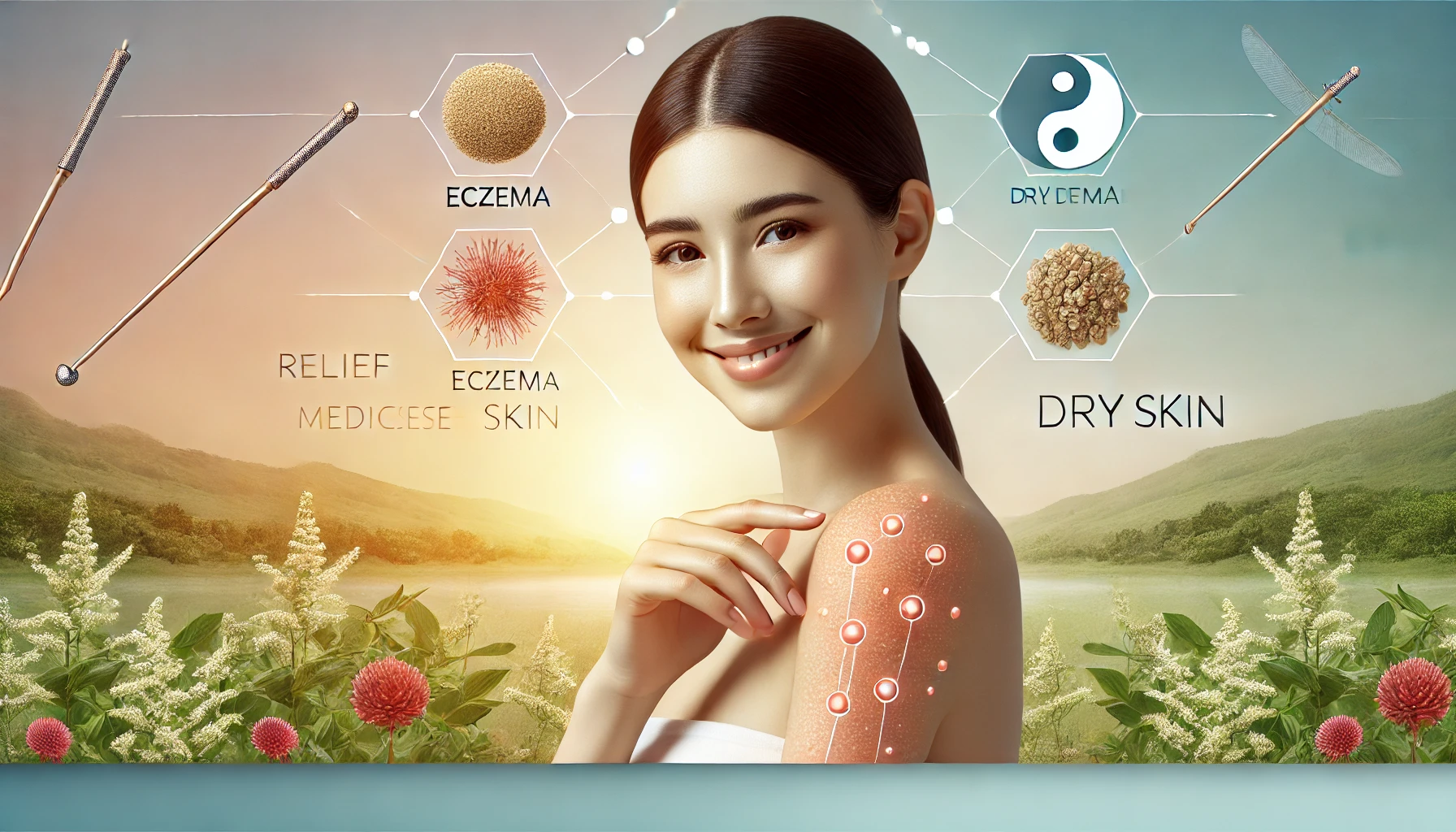Traditional Chinese Medicine (TCM) provides a comprehensive and holistic approach to skin health, especially for conditions like eczema, acne, and dry skin. TCM practitioners specialize in addressing TCM skin problems by identifying and treating the root causes of these issues. In contrast to conventional treatments that typically emphasize symptom relief, TCM aims to integrate acupuncture, Chinese herbal remedies, dietary modifications, and stress management techniques to promote lasting skin health.
This article examines how TCM can transform skincare regimens, improve overall well-being, and highlights Kean Chan TCM as a premier destination for specialized TCM treatments. By embracing TCM, individuals can discover the long-term benefits of achieving healthier skin and address skin problems.
Key Takeaways:
TCM takes a holistic approach to skin health, addressing both physical and emotional factors to treat eczema and dry skin.
By identifying the root cause of skin issues, TCM can effectively improve blood circulation and nourish the skin with herbal medicine, reducing inflammation and promoting skin health.
Incorporating TCM into skincare routines and combining it with conventional treatments can provide long-term benefits for eczema and dry skin, with specialized treatments available at Kean Chan TCM.
TCM’s Holistic Approach to Skin Health

Traditional Chinese Medicine (TCM) presents a holistic approach to skin health, emphasizing the interrelationship between the body’s internal health and various skin conditions like eczema, acne, and psoriasis. For those seeking effective treatments for TCM eczema Singapore, TCM targets the underlying causes of these skin disorders, utilizing treatments designed to balance the body’s qi, alleviate symptoms, and rejuvenate the skin, promoting overall well-being.
This methodology includes acupuncture, herbal medicine, and lifestyle modifications, aiming to enhance not only external beauty but also overall wellness. It underscores the importance of achieving harmony between the body’s internal systems and its external appearance, addressing both physical and emotional factors.
Identifying the Root Cause of Eczema and Dry Skin
Identifying the root causes of eczema and dry skin is of paramount importance in Traditional Chinese Medicine (TCM), as these common skin conditions are frequently indicative of deeper internal imbalances rather than isolated dermatological issues. TCM practitioners posit that external factors such as heat, dampness, and emotional stress can contribute to skin disorders, requiring a holistic approach to treatment. Therefore, it is essential to evaluate an individual’s overall health, lifestyle, and environmental influences to effectively address these prevalent skin conditions.
In TCM, the intricate relationship between emotional and physical health is critically important. Common triggers for TCM eczema and dry skin may include dietary choices, environmental pollutants, and stress levels. By analyzing individual health patterns, practitioners can develop tailored treatments that not only address skin symptoms but also enhance overall vitality, balancing qi and blood. This holistic approach acknowledges that skin health does not exist in isolation; rather, it serves as a reflection of internal well-being and internal medicine.
Potential treatment strategies may encompass herbal remedies, dietary modifications, and lifestyle changes designed to harmonize the body’s energies, thereby promoting a more balanced and healthful skin condition and alleviating symptoms. Key focus areas include:
- Emotional health influences
- Identifying food triggers
- Environmental impacts
The emphasis is placed on fostering lasting wellness rather than merely alleviating symptoms.
Using Acupuncture to Improve Blood Circulation
Acupuncture is a fundamental aspect of Traditional Chinese Medicine (TCM), recognized for its capacity to enhance blood circulation, which is essential for maintaining skin health and treating skin disorders. By targeting specific acupuncture points, practitioners of TCM can facilitate the balance of qi and improve blood flow to the skin, thereby addressing various dermatological concerns such as acne, dermatitis, and erythema, as well as reducing inflammation. This technique not only alleviates symptoms but also supports the body’s inherent healing processes, contributing to overall skin rejuvenation and addressing skin disease.
The efficacy of acupuncture in enhancing blood flow can be attributed to its ability to stimulate nerve endings that release various substances, including endorphins and serotonin, which play a role in promoting circulation. As blood flow increases, the skin is provided with greater amounts of nutrients and oxygen, resulting in improved elasticity and a more vibrant appearance, which can alleviate redness and rash.
For instance, a study published in the Journal of Clinical Acupuncture and Moxibustion reported significant improvements in skin hydration and elasticity in patients with chronic eczema following a regimen of acupuncture treatment. Additionally, multiple case studies have documented a reduction in inflammatory markers among individuals receiving acupuncture therapy, highlighting its potential in managing inflammatory skin conditions such as psoriasis.
Through these mechanisms, acupuncture functions not only as a therapeutic intervention but also as a holistic approach that enhances skin vitality by ensuring optimal blood flow and nourishment, encompassing emotional and mental health.
Herbal Medicine to Nourish the Skin
Herbal medicine constitutes a fundamental component of Traditional Chinese Medicine (TCM), employed to nourish the skin and address various dermatological conditions like psoriasis, eczema, and acne.
By integrating ancient wisdom with contemporary practices, TCM underscores the significance of herbal formulations that promote harmony between the body and skin, alleviating symptoms of chronic skin conditions. For those exploring Chinese medicine for eczema, commonly utilized herbs such as Dong Quai and Licorice root are instrumental in enhancing circulation and mitigating inflammation, both of which are critical factors in maintaining optimal skin health.
- Dong Quai is frequently included in formulations aimed at invigorating blood flow, which can alleviate symptoms associated with dry skin.
- Licorice root is well-regarded for its soothing properties and is often recommended to reduce redness and irritation, providing a calming effect for sensitive skin.
Formulations such as Xiao Feng San and San Huang San are specifically designed for inflammatory skin disorders like urticaria and psoriasis, with the objective of restoring balance and promoting healing. By nourishing the skin from within, these herbs not only address visible concerns but also contribute to overall well-being, promoting skin vitality.
Dietary Changes to Support Skin Health

Dietary modifications play a crucial role in Traditional Chinese Medicine (TCM) and can significantly enhance skin health by addressing internal imbalances. TCM underscores the connection between nutrition and internal well-being, positing that dietary choices directly influence the condition of the skin, helping to manage common skin conditions. Certain foods are believed to alleviate skin disorders, while others may exacerbate conditions such as acne or eczema, highlighting the importance of understanding food triggers. By integrating specific herbs and foods that align with TCM principles, individuals can help balance bodily systems, reduce inflammation, and promote clear, healthy skin.
In TCM, the management of skin conditions transcends superficial topical treatments and focuses on dietary interventions to address the root cause. Practitioners emphasize the importance of understanding the energetic properties of various foods, allowing them to create tailored dietary plans that address the unique needs of each individual, promoting skin health.
For example, foods abundant in antioxidants, such as goji berries and dark leafy greens, are recognized for their protective qualities for the skin, reducing inflammation and promoting skin health. Conversely, individuals experiencing heat-related skin issues such as rosacea may find relief through the consumption of cooling foods like cucumber, watermelon, and lotus root.
Certain herbs, including chamomile and calendula, are known for their ability to soothe inflammation, while spices such as ginger and turmeric are recommended for their anti-inflammatory properties, addressing a range of symptoms. Personalizing dietary choices based on specific symptoms is essential, as TCM acknowledges that each individual possesses a distinct bodily constitution, helping to manage skin conditions like acne.
Therefore, consulting a TCM practitioner can facilitate the development of a comprehensive dietary plan that not only enhances skin vitality but also addresses underlying health concerns, reducing symptoms of skin disease.
Stress Management Techniques
Stress management techniques are essential for maintaining skin health, particularly within the context of Traditional Chinese Medicine (TCM), which acknowledges the significant influence of emotional stress on various skin conditions. For individuals seeking Chinese medicine for eczema, TCM posits that emotional and mental imbalances can disrupt the flow of qi, exacerbating issues such as eczema, acne, and psoriasis, resulting in itchy skin. Consequently, incorporating relaxation techniques such as meditation, tai chi, or qigong can serve to alleviate stress while simultaneously enhancing skin health by restoring equilibrium to the body and reducing symptoms of itchy skin and rash.
In Traditional Chinese Medicine (TCM), the holistic approach underscores the interconnectedness of mental, emotional, and physical well-being, suggesting that effective stress management can improve skin vitality and resilience. Mindfulness practices encourage individuals to remain present, thereby reducing anxiety and tension, which can have detrimental effects on the skin. Traditional exercises like tai chi involve gentle movements that foster circulation and harmony within the body, thereby supporting the flow of qi and balancing yin and yang.
Some effective techniques include:
- Meditation: Assists in calming the mind, which can lower cortisol levels associated with skin flare-ups.
- Tai Chi: Promotes a meditative state through movement, enhancing focus and reducing stress.
- Qigong: This practice integrates breath control and movement to facilitate energy flow.
By integrating these practices into daily routines, individuals may experience not only a reduction in stress levels but also a noticeable improvement in their skin health, which can alleviate symptoms of skin conditions like eczema, psoriasis, and acne.
Combining TCM with Conventional Treatments
Combining Traditional Chinese Medicine (TCM) with conventional treatments provides an integrative approach to skin health that enhances the effectiveness of both modalities. TCM practitioners frequently collaborate with dermatologists, allowing patients to benefit from the strengths of acupuncture and herbal medicine in conjunction with Western treatments. This synergy not only addresses the symptoms of skin conditions but also targets their underlying causes, such as heat and dampness, thereby offering a more comprehensive treatment plan that promotes overall wellness.
Such collaborations can occur in various forms, significantly enriching patient experiences. For example, patients with eczema may receive acupuncture sessions aimed at reducing inflammation while also following a prescribed regimen of topical corticosteroids. This holistic approach can result in quicker relief and a reduced frequency of flare-ups.
An increasing number of dermatology clinics are incorporating TCM methods, with trained practitioners working alongside conventional healthcare professionals. This partnership ensures that therapies such as herbal remedies are carefully integrated, thereby enhancing skin hydration and improving overall skin vitality.
- Enhanced Symptom Relief: Many patients report more rapid improvements in their skin conditions when utilizing TCM alongside standard treatments.
- Comprehensive Care: This integrative method ensures that both immediate symptoms and underlying issues are addressed, paving the way for more enduring results.
Collaborative case studies have demonstrated that patients who adopt an integrative strategy often report a more positive quality of life, highlighting the unique strengths of both TCM and Western remedies working in harmony.
Personalized Treatment Plans
Creating personalized treatment plans is fundamental to Traditional Chinese Medicine (TCM), specifically designed to address the unique needs of individuals experiencing skin health challenges. TCM practitioners conduct comprehensive assessments to gain an understanding of each patient’s overall health, lifestyle, and specific skin conditions, such as eczema and acne, thereby enabling the formulation of a detailed treatment strategy. This individualized approach may include modalities such as acupuncture, herbal medicine, dietary recommendations, and stress management techniques, all aimed at restoring balance and effectively enhancing skin health.
To develop these tailored treatment plans, practitioners employ a range of assessment methods that facilitate a holistic understanding of the patient’s condition. These methods may include:
- Diagnostic Interviews: Engaging in in-depth discussions to collect detailed information regarding the patient’s symptoms, medical history, and lifestyle habits.
- Pulse Diagnosis: Assessing the pulse at various points on the wrist to gain insights into the body’s internal conditions.
- Tongue Diagnosis: Analyzing the tongue’s color, coating, and shape, which serve as key indicators of internal health and potential imbalances.
The treatment plans take multiple factors into account, including:
- Age: Acknowledging how different life stages influence skin health and treatment effectiveness.
- Lifestyle: Evaluating daily routines and stress levels that may contribute to dermatological issues.
- Specific Skin Conditions: Customizing ingredients and methods based on the presence of conditions such as acne, eczema, or psoriasis.
By addressing these components, practitioners aim to optimize treatment outcomes, thereby facilitating a pathway toward improved skin vitality and emotional well-being.
Long-Term Benefits of TCM for Skin Health

The long-term benefits of Traditional Chinese Medicine (TCM) for skin health are extensive, as it provides a holistic healing approach that addresses not only the symptoms but also the underlying causes of chronic skin conditions, such as heat and wind imbalances. For individuals dealing with TCM skin problems, the consistent application of acupuncture, herbal medicine, and lifestyle modifications can lead to sustained improvements in skin health, reduced inflammation, and the prevention of future skin disorders. TCM’s emphasis on maintaining internal balance and harmony ultimately promotes healthier, rejuvenated skin over time.
Research indicates that the adoption of TCM practices can significantly enhance the skin’s resilience against various issues over time.
- Regular acupuncture sessions may improve blood circulation, which subsequently nourishes the skin.
- Customized herbal formulas can aid in detoxifying and rejuvenating skin cells.
- Lifestyle changes recommended by TCM practitioners, such as stress management techniques, can further enhance the appearance of the skin.
Numerous practitioners report success stories in which clients have experienced remarkable transformations in their skin health. For example, a testimonial from a TCM practitioner details a patient who, after several months of treatment, observed a dramatic reduction in eczema flare-ups, crediting the success to a comprehensive TCM regimen.
These approaches illustrate how a commitment to TCM can result in lasting improvements in skin vitality and overall well-being.
Kean Chan TCM’s Specialized Eczema and Dry Skin Treatment
Kean Chan TCM provides specialized treatments specifically designed for individuals experiencing eczema and dry skin. Utilizing a combination of acupuncture and herbal medicine, these treatments aim to alleviate symptoms and promote overall skin health. This approach addresses itchy skin and other inflammatory skin issues with a focus on balancing qi and blood circulation.
The practitioners at Kean Chan TCM conduct a comprehensive assessment process to tailor their approach according to the unique needs and underlying causes of each patient’s skin condition. This ensures effective and lasting results. The service is dedicated not only to treating the symptoms of eczema and dry skin but also to improving the quality of life for those affected.
Clients benefit from a holistic strategy that incorporates innovative techniques blending both traditional and modern methodologies. These specialized treatments concentrate on restoring balance within the body while employing a carefully selected range of herbal remedies recognized for their soothing properties.
- Each session commences with an in-depth consultation to evaluate the skin’s condition as well as the patient’s overall well-being.
- Practitioners frequently recommend specific herbs, such as Licorice Root and Dong Quai, which have garnered numerous testimonials highlighting their effectiveness in reducing inflammation.
Client feedback reveals significant improvements in skin texture and a marked reduction in flare-ups, illustrating the transformative impact of these customized therapies. Their experiences emphasize how targeted treatments contribute to both symptom relief and enhanced overall life satisfaction.
What Is TCM and How Does It Differ from Western Medicine?
Traditional Chinese Medicine (TCM) represents a comprehensive health care system that prioritizes a holistic approach, emphasizing the balance of qi and the internal health of the body. This methodology stands in stark contrast to the practices commonly employed in Western medicine, which often focus on alleviating symptoms rather than addressing root causes such as internal imbalances and external factors.
TCM posits that health issues, including skin disorders such as eczema and acne, frequently arise from imbalances and external factors. As a result, TCM advocates for treatments focused on restoring harmony rather than solely alleviating symptoms.
This foundational difference in perspective informs the unique treatment options offered by TCM practitioners, positioning it as a valuable complement to conventional medical practices.
How Can TCM Help with Eczema and Dry Skin?
Traditional Chinese Medicine (TCM) can play a significant role in the management of eczema and dry skin by employing a variety of treatment modalities aimed at addressing the underlying causes of these conditions. Through acupuncture, TCM practitioners stimulate specific points on the body, promoting healing and improving overall well-being. Additionally, herbal medicine provides essential nutritional support, helping to balance the body’s systems and reduce inflammation. This comprehensive approach not only alleviates symptoms but also promotes long-term skin health by targeting the imbalances that contribute to chronic skin issues, such as lack of nourishment and heat and humidity.
In Traditional Chinese Medicine, the treatment of eczema and other skin conditions like acne and psoriasis involves a multifaceted strategy:
- Acupuncture enhances blood circulation and energy flow, facilitating the delivery of vital nutrients to the dermis.
- The use of tailored herbal remedies, such as Chinese licorice and chamomile, has demonstrated remarkable efficacy in moisturizing and nourishing the skin.
- These herbal extracts possess anti-inflammatory properties that help reduce redness and irritation, promoting overall comfort.
The synergy of these methods not only accelerates recovery but also establishes a more resilient skin ecosystem, thereby reducing the risk of flare-ups. Consistent application of these TCM practices can lead to visible improvements in skin texture and overall wellness, making this approach a valuable option for individuals seeking relief from the discomfort associated with eczema and dry skin.
What Are the Potential Side Effects of TCM for Skin Health and Skin Conditions Like Eczema?

While Traditional Chinese Medicine (TCM) is widely regarded as safe, it is crucial to recognize the potential side effects associated with its practices, particularly in relation to skin health and common skin conditions like eczema and dermatitis.
A thorough understanding of the nuances of TCM practices can significantly enhance an individual’s overall experience. Acupuncture may result in temporary discomfort or bruising, while certain herbal remedies can provoke allergic reactions if not administered correctly. For those addressing TCM eczema, it is crucial to consult a qualified practitioner to ensure treatments are tailored to individual needs. Additionally, some individuals may experience digestive disturbances or skin rashes following the use of herbal treatments, especially if they have specific sensitivities or skin disorders like rosacea and hives.
Thus, consulting with qualified TCM practitioners is essential to ensure that treatments are customized to the individual, thereby minimizing risks and maximizing benefits. These professionals not only possess the requisite expertise but also conduct comprehensive health assessments to guide individuals toward the most effective strategies for addressing skin conditions.
- Temporary discomfort from acupuncture
- Possible allergic reactions to herbs
- Digestive disturbances
- Skin rashes due to sensitivities
How Can One Incorporate TCM into Their Skincare Routine to Alleviate Skin Issues?
Incorporating Traditional Chinese Medicine (TCM) into a skincare routine can significantly enhance skin health and address a variety of concerns such as acne, eczema, and dryness. TCM believes that skin issues often stem from underlying causes such as imbalances in the body’s Qi and blood circulation. Individuals may integrate herbal remedies into their daily regimen by utilizing TCM-approved products that are suitable for their specific skin types and issues. Additionally, incorporating acupuncture sessions can substantially improve overall skin vitality, offering a holistic approach to beauty and wellness.
To fully embrace the principles of TCM, consider the following practical recommendations for refining your skincare routine:
- Herbal Products: Seek creams or serums that contain Chinese herbs such as ginseng, goji berries, or honeysuckle, which are recognized for their rejuvenating properties.
- Lifestyle Adjustments: Maintain a balanced diet rich in fruits and vegetables while moderating the intake of spicy or greasy foods that may exacerbate skin conditions.
- Acupuncture Frequency: Scheduling acupuncture treatments bi-weekly can enhance blood circulation and energy (Qi) throughout the body, promoting a healthier complexion.
By adopting these methods, individuals not only address specific skin issues but also foster a holistic approach that nurtures both the body and mind.
What Are the Success Rates of TCM for Eczema and Dry Skin?
The success rates of Traditional Chinese Medicine (TCM) in treating eczema and dry skin have shown promising results, with numerous patients reporting significant improvements in their conditions following TCM treatments. This approach to healing not only focuses on the symptoms but also on the root cause of skin diseases and imbalances in the body.
Research findings indicate that nearly 70% of individuals utilizing TCM have experienced noticeable relief from their symptoms, which contrasts with the approximately 50% success rate observed in conventional treatments for similar conditions. Patient testimonials suggest that their experiences with TCM included not only a reduction in itchiness and inflammation but also an overall enhancement in skin texture and vitality.
By embracing the holistic approach of TCM, many individuals have reported an improved quality of life, fostering a sense of well-being that transcends mere physical symptoms.
Key benefits noted include:
- Significant symptom reduction
- Enhanced skin hydration
- Improved emotional well-being
The integration of acupuncture and herbal remedies may offer patients a compelling alternative to conventional methods, providing a multi-faceted approach to effectively managing eczema and dry skin.
Why Choose Kean Chan TCM for Eczema and Dry Skin Treatment?
Choosing Kean Chan TCM for the treatment of eczema and dry skin offers patients a specialized and personalized approach to skin health. With experienced Traditional Chinese Medicine (TCM) practitioners who focus on identifying and addressing the root causes of skin conditions, patients can anticipate a comprehensive and effective method for managing their dermatological issues. Kean Chan TCM integrates traditional techniques with contemporary insights, ensuring that each patient receives the highest quality of care.
The clinic’s philosophy prioritizes holistic well-being, addressing not only the dermatological symptoms but also the physical and emotional health of patients. Each consultation entails a thorough analysis of the individual’s health history, lifestyle, and environmental factors that contribute to their skin conditions, including external factors such as heat and humidity.
Patients may benefit from a variety of treatments, including herbal therapies, acupuncture, and dietary recommendations specifically tailored to their unique needs. The clinic places a strong emphasis on ongoing support, giving the power to patients to make informed decisions regarding their skin health, especially in addressing chronic skin issues.
Ultimately, individuals who choose Kean Chan TCM will embark on a supportive journey toward healthier skin and enhanced overall wellness.
Frequently Asked Questions
How can TCM help with Eczema, Dry Skin, and Other Skin Disorders?
TCM, or Traditional Chinese Medicine, approaches eczema and dry skin holistically by identifying the root cause of the condition and treating it from the inside out. This can include addressing imbalances in the body, such as deficiency of certain organs or excessive heat or dampness, and using natural remedies to promote healing. Conditions like psoriasis and dermatitis can often be alleviated through this balanced approach, which includes acupuncture and the use of Chinese herbal medicine.
What are some TCM remedies for eczema and dry skin?
There are many TCM remedies that can help alleviate eczema and dry skin, including herbal formulas, acupuncture, and diet and lifestyle changes. Some commonly used herbs for treating skin conditions include Huang Bai, Bai Xian Pi, and Rehmannia. Acupuncture can also help by improving blood circulation and reducing inflammation in the affected areas. Additionally, techniques like cupping and the use of acupuncture points can be beneficial in addressing skin problems and promoting overall skin vitality.
Can TCM be used in conjunction with Western medicine for eczema and dry skin?
Yes, TCM can be used alongside Western medicine for eczema and dry skin. TCM practitioners may recommend a combination of treatments that can work together to address the root cause of the condition and provide relief from symptoms. It is important to consult with both your TCM practitioner and dermatologist to ensure that all treatments are safe and effective, especially for chronic conditions like rosacea or urticaria, which may benefit from a multifaceted approach.
Are there any lifestyle changes that can help with eczema and dry skin according to TCM?
According to TCM principles, certain lifestyle changes can help improve eczema and dry skin. This may include avoiding triggers such as certain foods or environmental allergens, practicing stress-reducing activities like qigong or tai chi, and maintaining a balanced diet and proper hydration to support overall health. TCM dermatology often emphasizes the regulation of emotional and mental stress, which can contribute to skin problems and the body’s overall internal health.
Is TCM suitable for all types of eczema and dry skin?
Yes, TCM can be beneficial for various types of eczema and dry skin, regardless of severity or duration of symptoms. Since TCM focuses on treating the underlying imbalances in the body, rather than just the symptoms, it can be effective for chronic or acute cases of eczema and dry skin. Skin conditions like acne, psoriasis, and atopic dermatitis can also benefit from TCM treatments that aim to balance yin and yang and promote skin health.
How long does it take to see results from TCM treatment for eczema and dry skin?
The length of time it takes to see results from TCM treatment for eczema and dry skin can vary depending on the individual’s condition and response to treatment. Some people may see improvement in a few weeks, while others may need several months of consistent treatment to see a significant difference. It is important to follow your TCM practitioner’s recommendations and have realistic expectations for the healing process. The integration of herbal medicine and acupuncture can promote skin rejuvenation and address various skin disorders effectively over time.

